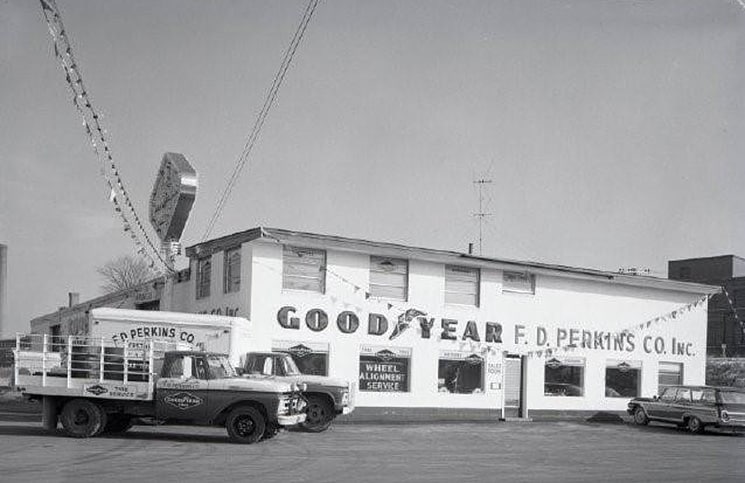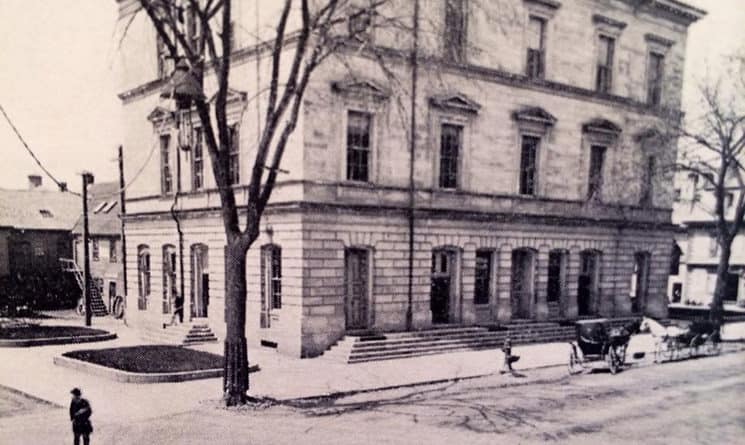Thousands of people packed into downtown Portsmouth this summer, toting a colorful assortment of flags, signs, and balloons for the city’s first LGBT Pride event. Members of the gay community and their straight allies celebrated openly on Pleasant Street, just days after the U.S. Supreme Court ruled that same-sex marriage is legal nationwide.
It was the same street that gay, lesbian, and transgender residents walked upon decades ago — then, though, they had to do so discreetly. In the 1980s, 40 Pleasant St., now home to 5 Thai Bistro, was Iris, a “women’s bar” that was open for most of the decade. A few blocks away on Daniel Street, the Sagamore Social Club, located on the third floor above the current location of The Press Room, was open from 1957 to 1978. And elsewhere in the city, behind what’s now a U-Haul store on Route 1, was Members, a gay bar that later moved to Green Street.
Now, the hidden past of the region’s LGBT community is coming to light, thanks to Tom Kaufhold. As the 50th anniversary of the 1969 Stonewall Inn uprising in New York City approaches — considered by many to be the birth of the modern gay-rights movement — Kaufhold, a Seacoast resident, wanted to commemorate the event locally by documenting the area’s gay-rights movement and the LGBT community’s overall influence on the city’s history. He approached the Portsmouth Athenaeum at a monthly Art ’Round Town event about hosting an exhibit in 2019, and a working group soon formed and began gathering materials.
“As people became more involved they said, ‘Why should we wait?’” said Kaufhold. They launched the Seacoast NH LGBT History Project to collect photos and artifacts, host events, and celebrate the community, both past and present. The aim was to use the events to raise awareness of efforts to gather what Kaufhold hopes will be a robust collection of photos and ephemera about Portsmouth’s and the region’s LGBT community.
Kaufhold’s own personal collection includes posters and fliers from the early 1990s, when activists were working to pass an equal rights ordinance in Portsmouth.
“So much has changed,” said Kaufhold. “We have marriage (equality) across the country. We never thought we’d see that. It happened so fast. I want people to remember that it wasn’t always this way.”
The Seacoast NH LGBT History Project is currently seeking photographs, fliers, posters, news articles, and any other materials that are associated with the region’s LGBT community. Kaufhold said he’s reached out to the area’s gay and lesbian organizations, which have contributed artifacts and shared information about former locations for gay bars and clubs. Kaufhold is especially interested in finding matchbooks from these bars and clubs.
“My big focus was getting artifacts from as far back as we can,” he said. At some point, the group would also like to find people willing to give their oral histories, something members of the LGBT community have done before through groups like Seacoast Outright.
But gathering these artifacts can prove challenging, especially when gay, lesbian, bisexual, and transgendered people often felt the need to keep their sexual identity hidden. The History Project, a Boston-based group aimed at preserving the history and contributions of the Massachusetts LGBT community, notes on its website that “documentation of the gay and lesbian experience is fragmentary and scattered,” and “has remained largely inaccessible to researchers, educators, the general public, and even the gay community itself.”
“This research and preservation is of paramount importance for the LGBT community, which is often excluded from history,” it continues. “In fact, some historians — whether deliberately or negligently — have taken steps to hide or obscure the nature of those contributions.”

The Seacoast NH LGBT History Project is collecting artifacts and information about the LGBT community’s past in the region. According to coordinator Tom Kaufhold, Members, an LGBT bar located behind this tire dealership on Route 1 in Portsmouth, was open for many years.
Courtesy photo
Tom Hardiman, the keeper of the Athenaeum, which will eventually house the Seacoast NH LGBT History Project collection, said in cases like this, gathering materials relies heavily on word of mouth.
“There may be somebody who has some letters or photos that may be relevant and they may not know this project is going on,” said Hardiman.
A recent effort to collect historical information about the North End neighborhood that was razed during the city’s urban renewal period in the mid-20th century was aided by the Portsmouth Public Library and members of the city’s Italian-American community, which made up much of the population of the former neighborhood. These groups helped spread the word through phone calls and emails to friends and family. The results of this search can be seen on the Portsmouth Athenaeum website.
As Kaufhold has spoken to people about this project, he’s found some valuable material scattered around the Seacoast that he never knew existed, from photos of old gay clubs to early 1990s oral histories of Seacoast-area LGBT teens.
“The more the word gets out, the more I’m realizing there’s a lot of stuff out there we can build upon,” said Kaufhold.
The Seacoast NH LGBT History Project holds monthly meetings at the Portsmouth Public Library. The group is looking for materials for the project as well as volunteers to help out. Contact them at seacoastnhlgbthistory@gmail.com or find them on Facebook.

